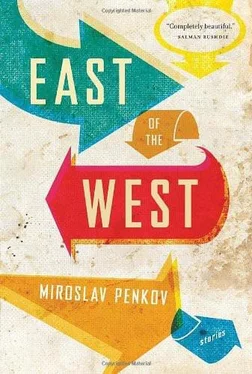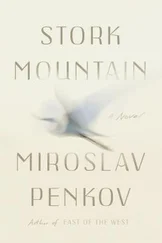I wonder if the rebel’s grave is still there, in that Macedonian village. And if we went there, would we find it? An empty plan starts to take shape. What if I pulled some strings? There are one or two old comrades who can help us out. What if they loaned us a car, stamped our passports? We’ll take Buryana and Pavel with us.
I lower the half-eaten apple from the ledge and flip it in my hand. How calm your face, Nora, I want to say, how even your breaths. Teach me to breathe like you. To wave my palm and turn the raging surf to glass.
Instead I call her name. Slowly, she limps over and eases down beside me. “I’ve never told you this,” I say. “We never buried Brother. That was a lie. We never took him off the rope. I’d heard rumors, stories from people in our mountain, of how when mothers recognized their gunned-down children the tsarists pulled them aside and shot them on the spot. And so I told Mother, ‘I beseech you in your daughters’ blood, keep walking. Don’t say a word.’ And Mother was so shocked then she stood before my brother and didn’t even reach to touch his feet. We walked right past.”
I know that this will never be, but still I say, “Let’s go to Macedonia. Let’s find the grave. I’ll borrow a car.” I want to say more, but I don’t. She watches me. She takes my hand and now my hand, too, trembles with hers. I see in the apple the marks of Pavel’s teeth and, in the brown flesh, a tiny tooth. I show it to Nora and it takes her eyes a moment to recognize what it is they see. Or so I think.
But then she nods without surprise, as if this is just what she expected. Isn’t it good to be so young, she wants to tell me, that you can lose a tooth and not even notice?
It takes me thirty years, and the loss of those I love, to finally arrive in Beograd. Now I’m pacing outside my cousin’s apartment, flowers in one hand and a bar of chocolate in the other, rehearsing the simple question I want to ask her. A moment ago, a Serbian cabdriver spat on me and I take time to wipe the spot on my shirt. I count to eleven.
Vera , I repeat once more in my head, will you marry me?
•
I first met Vera in the summer of 1970, when I was six. At that time my folks and I lived on the Bulgarian side of the river, in the village of Bulgarsko Selo, while she and her folks made home on the other bank, in Srbsko. A long time ago these two villages had been one — that of Staro Selo — but after the great wars Bulgaria had lost land and that land had been given to the Serbs. The river, splitting the village in two hamlets, had served as a boundary: what lay east of the river stayed in Bulgaria and what lay west belonged to Serbia.
Because of the unusual predicament the two villages were in, our people had managed to secure permission from both countries to hold, once every five years, a major reunion, called the sbor . This was done officially so we wouldn’t forget our roots. In reality, though, the reunion was just another excuse for everyone to eat lots of grilled meat and drink lots of rakia . A man had to eat until he felt sick from eating and he had to drink until he no longer cared if he felt sick from eating. The summer of 1970, the reunion was going to be in Srbsko, which meant we had to cross the river first.
•
This is how we cross:
Booming noise and balls of smoke above the water. Mihalaky is coming down the river on his boat. The boat is glorious. Not a boat really, but a raft with a motor. Mihalaky has taken the seat of an old Moskvich, the Russian car with the engine of a tank, and he has nailed that seat to the floor of the raft and upholstered the seat with goat skin. Hair out. Black and white spots, with brown. He sits on his throne, calm, terrible. He sucks on a pipe with an ebony mouthpiece and his long white hair flows behind him like a flag.
On the banks are our people. Waiting. My father is holding a white lamb under one arm and on his shoulder he is balancing a demijohn of grape rakia . His shining eyes are fixed on the boat. He licks his lips. Beside him rests a wooden cask, stuffed with white cheese. My uncle is sitting on the cask, counting Bulgarian money.
“I hope they have deutsche marks to sell,” he says.
“They always do,” my father tells him.
My mother is behind them, holding two sacks. One is full of terlitsi —booties she has been knitting for some months, gifts for our folks on the other side. The second sack is zipped up and I can’t see what’s inside, but I know. Flasks of rose oil, lipstick and mascara. She will sell them or trade them for other kinds of perfumes or lipsticks or mascara. Next to her is my sister, Elitsa, pressing to her chest a small teddy bear stuffed with money. She’s been saving. She wants to buy jeans.
“Levis,” she says. “Like the rock star.”
My sister knows a lot about the West.
I’m standing between Grandma and Grandpa. Grandma is wearing her most beautiful costume — a traditional dress she got from her own Grandma that she will one day give to my sister. Motley-patterned apron, white hemp shirt, embroidery. On her ears, her most precious ornament — the silver earrings.
Grandpa is twisting his mustache.
“The little bastard,” he’s saying, “he better pay now. He better.”
He is referring to his cousin, Uncle Radko, who owes him money on account of a football bet. Uncle Radko had taken his sheep by the cliffs, where the river narrowed, and seeing Grandpa herding his animals on the opposite bluff, shouted, “I bet your Bulgars will lose in London!” and Grandpa shouted back, “You wanna put some money on it?” And that’s how the bet was made, thirty years ago.
There are nearly a hundred of us on the bank, and it takes Mihalaky a day to get us all across the river. No customs — the men pay some money to the guards and all is good. When the last person sets his foot in Srbsko, the moon is bright in the sky and the air smells of grilled pork and foaming wine.
Eating, drinking, dancing. All night long. In the morning everyone has passed out in the meadow. There are only two souls not drunk or sleeping. One of them is me and the other one, going through the pockets of my folks, is my cousin Vera.
•
Two things I found remarkable about my cousin: her jeans and her sneakers. Aside from that, she was a scrawny girl — a pale, round face and fragile shoulders with skin peeling from the sun. Her hair was long, I think, or was it my sister’s hair that grew down to her waist? I forget. But I do recall the first thing that my cousin ever said to me:
“Let go of my hair,” she said, “or I’ll punch you in the mouth.”
I didn’t let go because I had to stop her from stealing, so, as promised, she punched me. Only she wasn’t very accurate and her fist landed on my nose, crushing it like a Plain Biscuit. I spent the rest of the sbor with tape on my face, sneezing blood, and now I am forever marked with an ugly snoot. Which is why everyone, except my mother, calls me Nose.
•
Five summers slipped by. I went to school in the village and in the afternoons I helped Father with the fields. Father drove an MTZ-50, a tractor made in Minsk. He’d put me on his lap and make me hold the steering wheel and the steering wheel would shake and twitch in my hands as the tractor ploughed diagonally, leaving terribly distorted lines behind.
“My arms hurt,” I’d say. “This wheel is too hard.”
“Nose,” Father would say, “quit whining. You’re not holding a wheel. You’re holding life by the throat. So get your shit together and learn how to choke the bastard, because the bastard already knows how to choke you.”
Mother worked as a teacher in the school. This was awkward for me, because I could never call her “Mother” in class and because she always knew if I’d done my homework or not. But I had access to her files and could steal exams and sell them to the kids for cash.
Читать дальше











